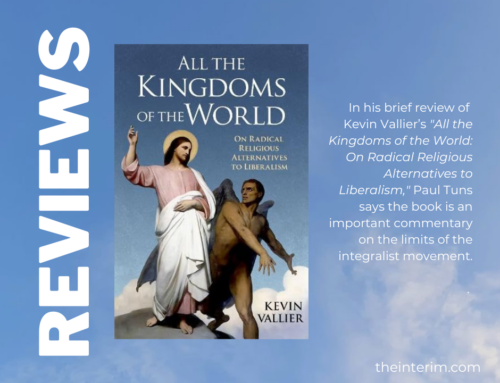Even by the low standards of political memoirs – especially ones released prior to a new electoral campaign – Olivia Chow’s My Journey (Harper Collins, $29.99, 328 pages), published in the lead-up to the 2014 Toronto mayoral election, is incredibly unsatisfying. Like all such memoirs, it puffs up the author (overcoming abusive relationships and adapting to a new country as an immigrant) and highlights key political causes (gay rights, child care, and apology for the Chinese Head Tax), but it offers nothing new to the story of the already famous politician.
My Journey provides a cursory retelling of the key political moments from running for school board trustee to city councillor to federal member of Parliament (including several failures), and yet it skimps on the interesting inside baseball details that such a memoir can provide. She checks off the names of everyone that helped, but does not share the trials and tribulations of campaigning; there is simply no drama to the retelling of these tales.
To most readers, her relationship with Jack Layton, also a city councillor and later federal NDP leader, will be the most interesting part of the story, and yet that, too is a disappointment. The couple seemed a perfect match, but her stories lack a personal spark, instead focusing on their shared political values. Even talking about Layton’s death – his battle with cancer, passing, and state funeral – seems perfunctory. We learn they watched “humorous but meaningful” movies in his final days, but little about the challenges and difficulties that his illness presented to them as a couple.
The biggest disappointment is what Chow didn’t address. In 2010, the NDP was divided on Bloc Quebecois MP Francine Lalonde’s private member’s bill on euthanasia. Layton and Chow themselves were on opposite sides of the vote (Chow in favour, Layton against). Some exploration of that difference of opinion would have been appreciated, and insightful. Instead, nothing. She did not even address the issue during a lengthy reflection on dying and death as part of the chapter on Layton’s death. Perhaps a sign of disunity in the family doesn’t fit the narrative of the political power couple.
Likewise, Chow talks about how she was a “fundamentalist” Christian when she went to university and was “obsessed with” questions such as why God allows evil, what does free will mean, and “what other forms of worship are practiced by other religions” and how that fits with her own (undefined) Christianity. Weighty questions for sure and Chow lists the courses she took (six of them!) to “find the answers.” What were those answers? We don’t know because she drops the issue. This paragraph was surely meant to show she is a serious thinker, but there is no evidence of an intellectual journey going on. Later she states she had “debates” with her church elders, but does not provide the substance. She does not share the story – assuming there was one – of how she got to the United Church of Canada. For many people, their faith helps decide their politics, but I assumed that politics led Chow to the UCC. My Journey offers no assistance in understanding Chow’s faith journey.
The best part of the book is her explanation of how she got Metro Council (Toronto then had two levels of government until the mid-1990s) to provide health benefits and bereavement leave for homosexuals. She details the campaign to build support for the change, from creating coalitions with partners from other levels of government to getting volunteers to canvass the city to sign a petition to make it seem like there was grassroots support, and several important individual lobbying efforts. In one case, an unidentified “we” pressed a colleague’s Christian pastor to convince the councillor that same-sex benefits was not “an affront to his religion.” In another case, they found a lesbian niece of a Catholic councillor to convince her uncle to support same-sex benefits. It was very strategic and Chow explains it all. Politicians and activists involved in other issues have much to learn from those few pages.
Early in the Toronto mayor’s race, Chow was leading in the polls. She has since fallen to a distant third. There is no doubting among either voters or readers of her autobiography Chow’s commitment to her decidedly left-wing causes. She cares passionately about a lot of politically correct issues, but her ability to explain them and, more importantly, persuade people to adopt her views is questionable. That may explain why she has lost support among voters of Canada’s largest city. It certainly explains why her memoir seldom rises above platitude-sharing. As a window into how Chow views herself – or at least wants the public to view her – My Journey is useful but to discerning readers, the thirst to know more about the author and politician will be unquenched.
Paul Tuns is the editor of The Interim and author of Jean Chretien: A Legacy of Scandal.





